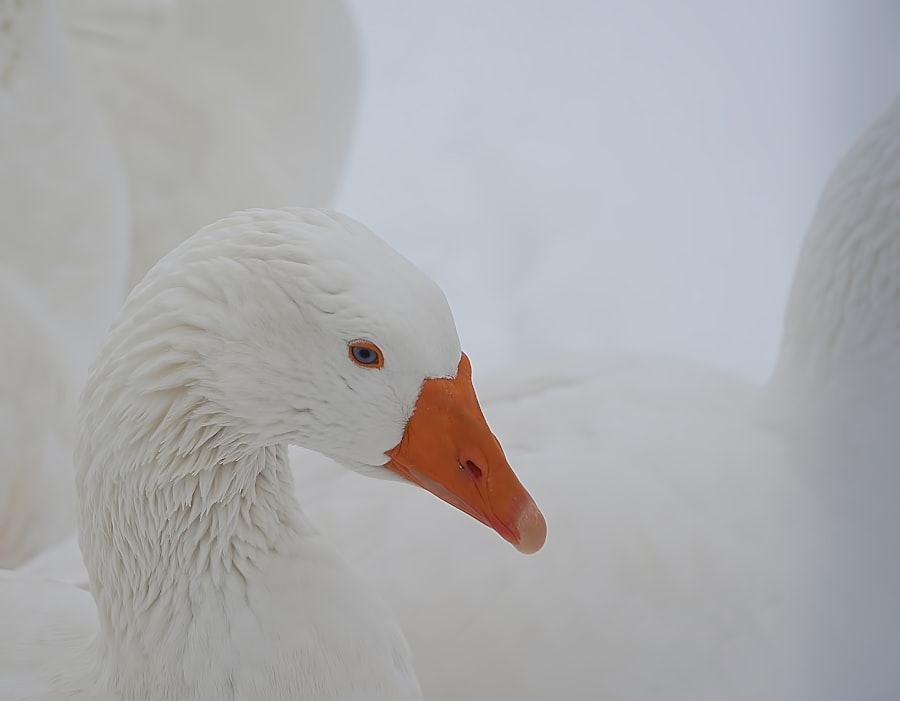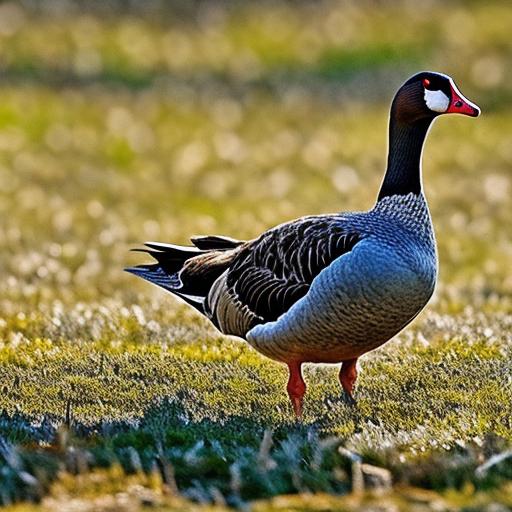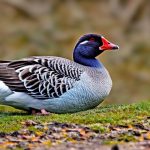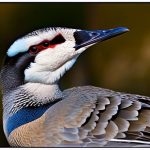Geese are large waterfowl that are known for their distinctive honking sound and V-shaped flying formation. They are highly adaptable birds that can be found in a variety of habitats, including lakes, ponds, and grassy areas. Geese are social animals that typically live in flocks and mate for life. They are also known for their aggressive behavior, especially during nesting season.
Understanding the habits of geese is crucial for effective geese control. By understanding their behavior, property owners can implement strategies to deter geese from nesting on their property. This can help prevent damage to property and reduce the health risks associated with geese droppings.
Key Takeaways
- Geese are migratory birds that can cause damage to property and pose health risks.
- Physical barriers such as fences and netting can be effective in keeping geese away.
- Chemical repellents can be used, but their effectiveness varies and they may harm other wildlife.
- Scare tactics such as decoys and noise makers can be effective in deterring geese.
- Natural methods such as landscaping and habitat modification can also be effective in keeping geese away.
Understanding the Risks of Geese on Property
Geese can cause significant damage to property, especially when they nest in large numbers. They can destroy lawns and gardens by feeding on grass and plants, leaving behind unsightly patches of bare ground. Geese droppings can also be a nuisance, as they can accumulate quickly and create an unsanitary environment.
In addition to property damage, geese droppings can pose health risks to humans and pets. The droppings contain bacteria and parasites that can cause diseases such as salmonella and giardia. These diseases can be transmitted through direct contact with the droppings or by ingesting contaminated water or food.
Taking action to prevent geese from nesting on property is essential to mitigate these risks. By implementing effective geese control measures, property owners can protect their property and ensure the safety of themselves and their pets.
Physical Barriers to Keep Geese Away
One effective method of geese control is the use of physical barriers. There are several types of physical barriers that can be used to deter geese from nesting on property.
Fencing is a common physical barrier used to keep geese away. A fence should be at least three feet high and have small openings to prevent geese from squeezing through. Electric fencing can also be effective, as it delivers a mild shock to deter geese from approaching.
Another physical barrier option is the use of netting. Netting can be installed over ponds or other water features to prevent geese from landing and nesting. It is important to ensure that the netting is securely fastened and does not pose a risk to other wildlife.
Pros of physical barriers include their effectiveness in preventing geese from accessing certain areas. They are also a long-term solution that does not require ongoing maintenance or the use of chemicals. However, physical barriers can be expensive to install and may not be aesthetically pleasing.
Chemical Repellents and their Effectiveness
Chemical repellents are another option for geese control. There are several types of chemical repellents available, including sprays, gels, and granules. These repellents typically contain ingredients that are unpleasant to geese, such as methyl anthranilate or capsaicin.
The effectiveness of chemical repellents can vary depending on several factors, including the type of repellent used, the concentration of active ingredients, and the frequency of application. It is important to follow the manufacturer’s instructions when using chemical repellents to ensure their effectiveness.
Safety considerations should also be taken into account when using chemical repellents. Some repellents may be harmful to humans, pets, or other wildlife. It is important to choose repellents that are safe for use in the intended area and to follow all safety precautions.
Scare Tactics to Deter Geese
Scare tactics can be an effective method of geese control. There are several types of scare tactics that can be used to deter geese from nesting on property.
Visual scare tactics involve the use of visual deterrents, such as scarecrows or reflective tape. These deterrents create a visual disturbance that can scare geese away. Auditory scare tactics involve the use of loud noises, such as sirens or fireworks, to startle geese and discourage them from nesting.
Pros of scare tactics include their effectiveness in deterring geese and their low cost. They can be easily implemented and do not require ongoing maintenance or the use of chemicals. However, scare tactics may not be effective in all situations, especially if geese become accustomed to the deterrents.
Natural Methods for Keeping Geese off Property

There are several natural methods that can be used to keep geese off property. These methods involve creating an environment that is unattractive to geese and discourages them from nesting.
One natural method is the use of landscaping techniques that make it difficult for geese to access certain areas. This can include planting tall grasses or shrubs around ponds or other water features to create a barrier. It can also involve removing or reducing areas of open grass that geese prefer for nesting.
Another natural method is the use of predator decoys. These decoys mimic natural predators of geese, such as coyotes or owls, and can deter geese from nesting in the area. It is important to move the decoys regularly to prevent geese from becoming accustomed to them.
Factors that can affect the effectiveness of natural methods include the specific habitat and behavior of geese in the area. It may be necessary to experiment with different techniques to find what works best for a particular property.
Maintenance and Upkeep of Geese Deterrents
Regular maintenance and upkeep of geese deterrents is essential for their effectiveness. Over time, physical barriers may become damaged or worn, and chemical repellents may lose their effectiveness. It is important to regularly inspect and repair deterrents to ensure they are functioning properly.
Tips for effective maintenance and upkeep include:
– Regularly inspecting physical barriers for damage and repairing as needed.
– Reapplying chemical repellents according to the manufacturer’s instructions.
– Moving scare tactics regularly to prevent geese from becoming accustomed to them.
– Monitoring the effectiveness of natural methods and making adjustments as needed.
Signs that maintenance is needed include an increase in geese activity or nesting on the property, damage to physical barriers, or a decrease in the effectiveness of deterrents. It is important to address these signs promptly to prevent further damage and ensure the continued success of geese control efforts.
Working with Professionals to Keep Geese Away
In some cases, it may be necessary to work with professionals to effectively control geese on property. Professional geese control services have the knowledge and experience to implement effective strategies and ensure long-term success.
When choosing a professional geese control service, it is important to consider several factors. These include the company’s experience and reputation, their knowledge of local geese behavior and habitats, and their ability to provide ongoing maintenance and support.
Benefits of working with a professional include their expertise in geese control techniques, their access to specialized equipment and resources, and their ability to handle legal considerations. Professionals can also provide ongoing monitoring and maintenance to ensure the continued success of geese control efforts.
Legal Considerations for Removing Geese
When implementing geese control measures, it is important to be aware of and comply with any laws or regulations related to geese removal. In many areas, geese are protected under federal or state laws, and it is illegal to harm or disturb them without proper permits.
It is important to consult local authorities or wildlife agencies to determine the legal requirements for geese control in a particular area. This may involve obtaining permits or following specific guidelines for humane removal methods.
Navigating legal considerations can be complex, but it is essential to follow legal guidelines to avoid fines or other penalties. Working with professionals who are familiar with local laws and regulations can help ensure compliance and prevent legal issues.
Conclusion and Final Thoughts on Geese Control
In conclusion, understanding the habits of geese and implementing effective geese control measures is crucial for property owners. Geese can cause significant damage to property and pose health risks through their droppings. By using physical barriers, chemical repellents, scare tactics, or natural methods, property owners can deter geese from nesting on their property.
Regular maintenance and upkeep of geese deterrents is essential for their effectiveness. It is important to monitor the success of geese control efforts and make adjustments as needed. In some cases, it may be necessary to work with professionals to ensure long-term success.
Legal considerations should also be taken into account when implementing geese control measures. It is important to follow all laws and regulations related to geese removal to avoid fines or other penalties.
Taking action to prevent geese from nesting on property is essential for protecting property and reducing health risks. By implementing effective geese control measures, property owners can create a safe and enjoyable environment for themselves and their pets.
If you’re looking for effective ways to keep geese off your property, you might find this article on “Chicken Coop Door Size” helpful. It provides valuable insights into the importance of choosing the right door size for your chicken coop, which can also be applied to keeping geese out. Understanding the dimensions and design of your coop’s entrance can play a crucial role in preventing unwanted visitors like geese from entering. Check out the article here to learn more about this essential aspect of poultry management.
FAQs
What are some effective ways to keep geese off my property?
There are several effective ways to keep geese off your property, including using decoys, installing fencing or netting, using repellents, and modifying the landscape.
What are some natural repellents that can be used to keep geese away?
Some natural repellents that can be used to keep geese away include planting certain types of vegetation, using noise deterrents, and using visual deterrents such as reflective tape or balloons.
Is it legal to harm or kill geese to keep them off my property?
No, it is not legal to harm or kill geese to keep them off your property. Geese are protected under federal law, and harming or killing them can result in fines and other legal consequences.
What are some potential health risks associated with having geese on my property?
Geese can carry diseases such as avian influenza and salmonella, which can be transmitted to humans through contact with their feces or other bodily fluids. Additionally, their droppings can create unsanitary conditions and attract other pests.
What should I do if I encounter an injured or sick goose on my property?
If you encounter an injured or sick goose on your property, it is best to contact a local wildlife rehabilitation center or animal control agency for assistance. Attempting to handle or care for the goose yourself can be dangerous and may further harm the animal.
Meet Walter, the feathered-friend fanatic of Florida! Nestled in the sunshine state, Walter struts through life with his feathered companions, clucking his way to happiness. With a coop that’s fancier than a five-star hotel, he’s the Don Juan of the chicken world. When he’s not teaching his hens to do the cha-cha, you’ll find him in a heated debate with his prized rooster, Sir Clucks-a-Lot. Walter’s poultry passion is no yolk; he’s the sunny-side-up guy you never knew you needed in your flock of friends!







